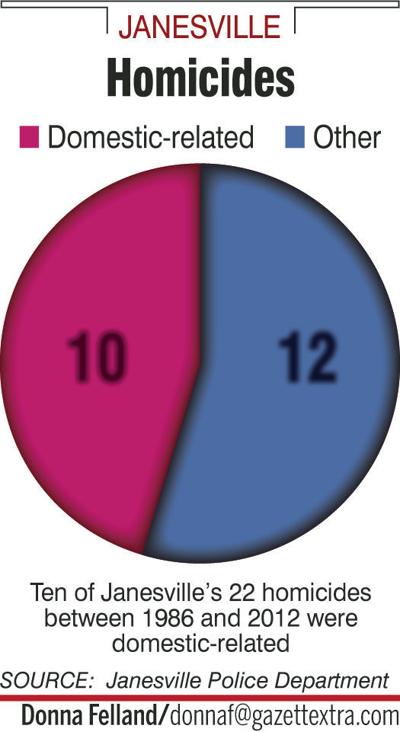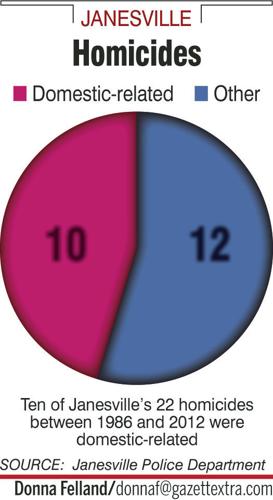JANESVILLE
In 2017, the Janesville Police Department responded to nearly 800 domestic-related calls.
The calls ranged in severity, with some not ending in arrests.
Domestic violence incidents can, however, be far more severe. Ten of the 22 homicides in Janesville from 1986 to 2012 were domestic-related.
To more quickly connect high-risk domestic violence victims with services that can help them, the Janesville Police Department has partnered with the YWCA Rock County to enact a new protocol.
The new initiative, called the Lethality Assessment Program, was developed by the Maryland Network Against Domestic Violence and uses research from Johns Hopkins University.
It consists of 11 questions, including ones about access to weapons and previous threats, that police can ask on the scene and determine whether a victim is at high risk, said Janesville police Sgt. Brian Vaughn.
Thirty-seven states use the program, according to a Janesville police news release. In Wisconsin, 93 law enforcement agencies in 19 counties use it.
In 2016, Wisconsin had more deaths related to domestic violence than any other year in the stateÔÇÖs historyÔÇö59 victims were killed and 14 perpetrators killed themselves after committing a homicide, according to the release. It was the most recent year for which data were available.
Vaughn said it is powerful to have ÔÇťan officer tell you to your face, ÔÇśListen, people in your position have been killed. This is serious. You need to take action.ÔÇÖÔÇŁ
Before the new protocol went into effect, police responding to domestic calls would ensure the victim was immediately safe. They would then receive follow-up from an intervention team member within 72 hours. The officer would provide such other resources, as help setting up a restraining order.
Now, a responding officer can ask the victim 11 questions. If the victim says yes to any of the first three on the list or answers affirmatively to any four of the rest, police will call the domestic violence hotline and try to connect the victim with services on the spot.
Those who do not meet the high-risk threshold will still get the services within three days, Vaughn said.
Consistent with state statute, the incidents police consider to be ÔÇťdomestic-relatedÔÇŁ involve adults who have lived together, have a child together or have been married, Vaughn said.
Based on a homicide in Janesville many years ago, Vaughn said the department started its Domestic Violence Intervention Team, which consists of two supervisors and about eight officers.
Members from the department and YWCA Rock County were trained in October and have since trained their respective staffs, said Katrina Carlson, communications director for YWCA Rock County.
Victims donÔÇÖt always reach out when theyÔÇÖre just handed a pamphlet, Carlson said. The new method cuts out ÔÇťlag timeÔÇŁ for victims who might be in danger.
The YWCA can arrange for legal advocates to help with restraining orders, set up safety plans or bring victims into the shelter.
The YWCAÔÇÖs Alternatives to Violence program assisted more than 900 victims last year who either stayed in the shelter, called or texted the hotline, and utilized safety plan or restraining order help, Carlson said.
The new protocol does not change how police interact with perpetrators, Vaughn said. In more severe cases, they will ask the district attorneyÔÇÖs office for certain bond conditions.
Although no substantive steps have been taken here, Vaughn said his department is watching other agencies that are trying preventive approaches that involve the perpetrator, such as counseling.
The new system for victims might not be a ÔÇťcrystal ball,ÔÇŁ but Vaughn said the evidence shows it works.
ÔÇťItÔÇÖs something that we really think could be useful, could save a life,ÔÇŁ he said. ÔÇťThey might not always realize how violent or how dangerous their situation is.ÔÇŁ










